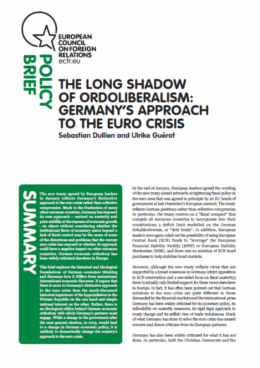The long shadow of ordoliberalism: Germany’s approach to the euro crisis
The thinking behind Germany’s unpopular approach to the crisis
Germany's approach to the euro crisis: why Berlin does not mind being unpopular
With the EU agreeing to a second Greek bail out, the spotlight is on the delicate balance between demands for fiscal rectitude and the argument that growth needs flexibility.
Berlin thinks the only solution to the crisis is a German one, and that means fiscal rectitude above all else. It also has the power to enforce its will. January’s agreement over the wording of a new treaty aimed primarily at tightening Eurozone fiscal policy shows that German positions rather than collective compromise wins the day.
But – with Germany being criticised for inflexibility over the role of the ECB, Eurobonds, austerity and treaty changes – why does Mrs Merkel take such a consistently hard line?
A new ECFR paper by Sebastian Dullien and Ulrike Guerot – ‘The long shadow of ordoliberalism: Germany’s approach to the euro crisis’ – argues that:
- Germany’s rigidity is not just about simple national interest and the psychological scars of Weimar-era hyperinflation. It is about a broadly-held belief in the foundations for economic success, as shown by German historical success.
- Austerity is not just about teaching others a lesson: it is about building the foundations for sustainable economic growth (and Germans believe that this view is substantiated by their country’s post-war and post-reunification experience). This is not up for negotiation.
- Attacking excessive austerity and demanding a renegotiation of the new fiscal treaty will simply fall on deaf ears. Instead, a more promising strategy might be to demand pan-European growth and investment programmes with more spending and taxation power shifted towards the EU level.
“Mainstream German opinion believes that harsh austerity measures are the key to breaking the cycle of debt and the threat of insolvency, reassuring the private sector and thus triggering natural and sustainable growth. Arguing about this will not change their mind.” Sebastian Dullien
“Even a change in the German government would not alter Berlin’s commitment to imposing austerity. The rest of Europe must understand this and find other areas for compromise, such as the timescale for balancing budgets.” Ulrike Guerot.
This paper is part of ECFR's Germany in Europe project, which examines the changing role of Germany within the EU, and the implications for Germany, Germany's European partners, and Europe's place in the world. The Germany in Europe project is supported by Stiftung Mercator.
ECFR is also running a Reinventing Europe project, looking at how Europe can rethink its medium to long term future once the immediate crisis recedes. The Reinventing Europe project is supported by Steven Heinz.
The European Council on Foreign Relations does not take collective positions. ECFR publications only represent the views of their individual authors.



